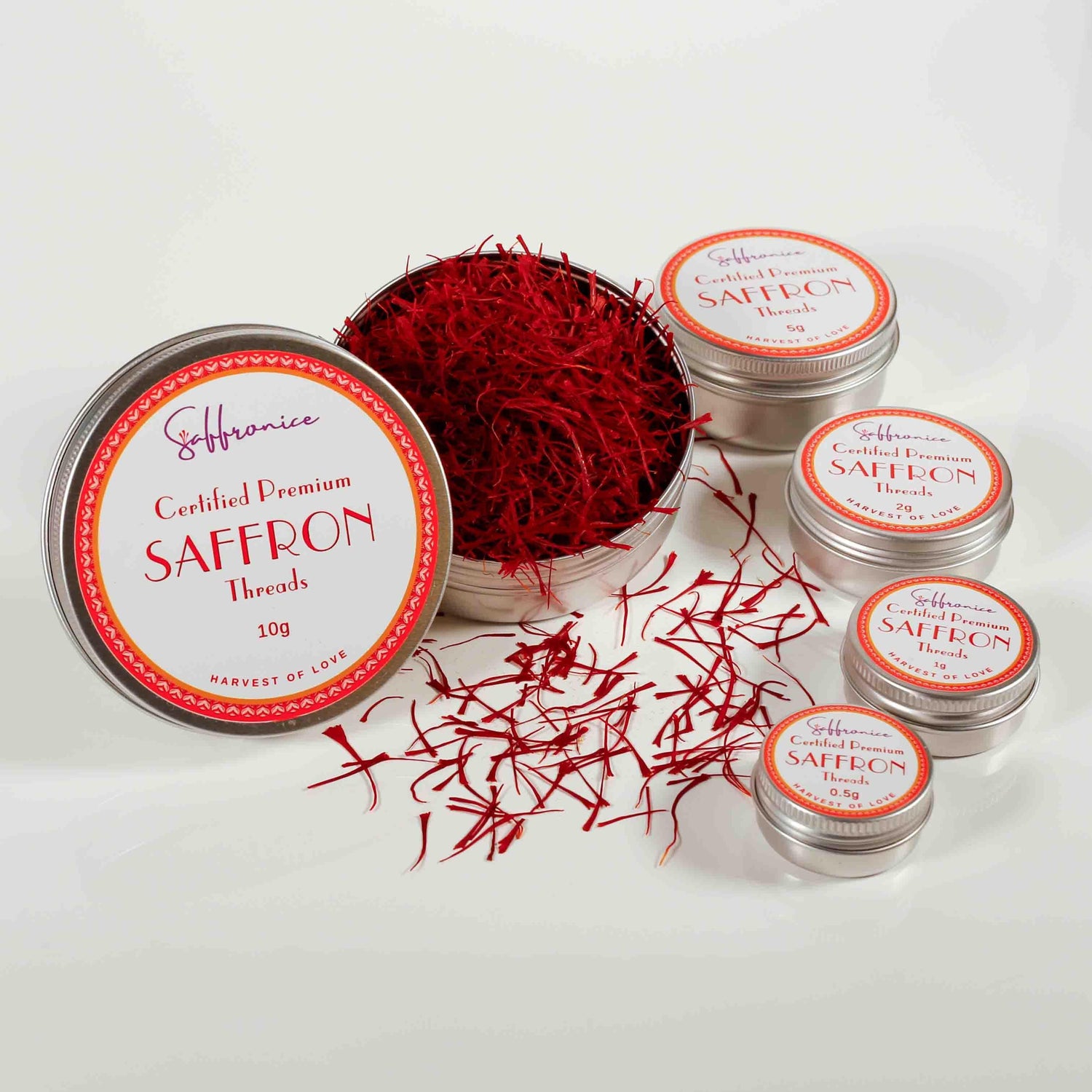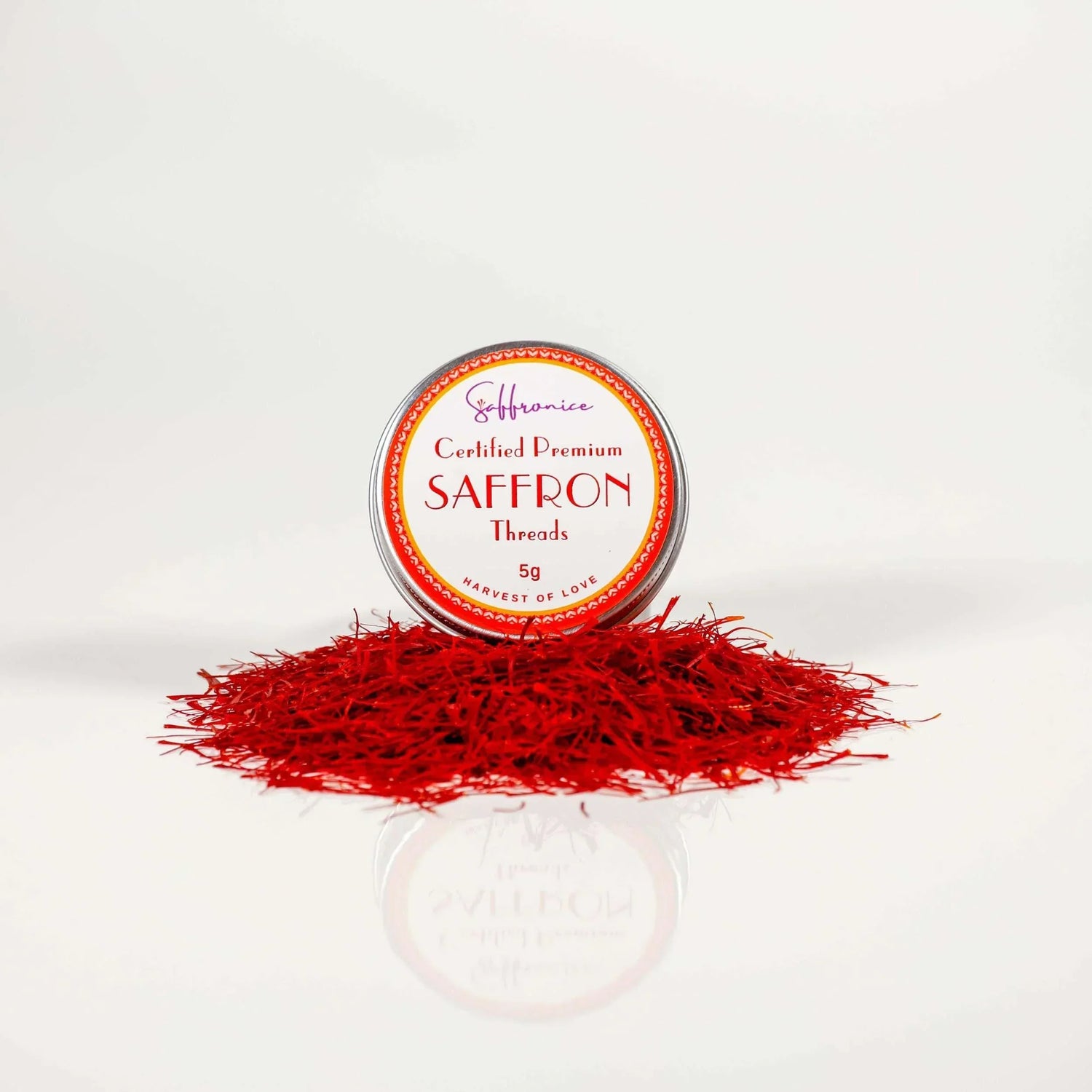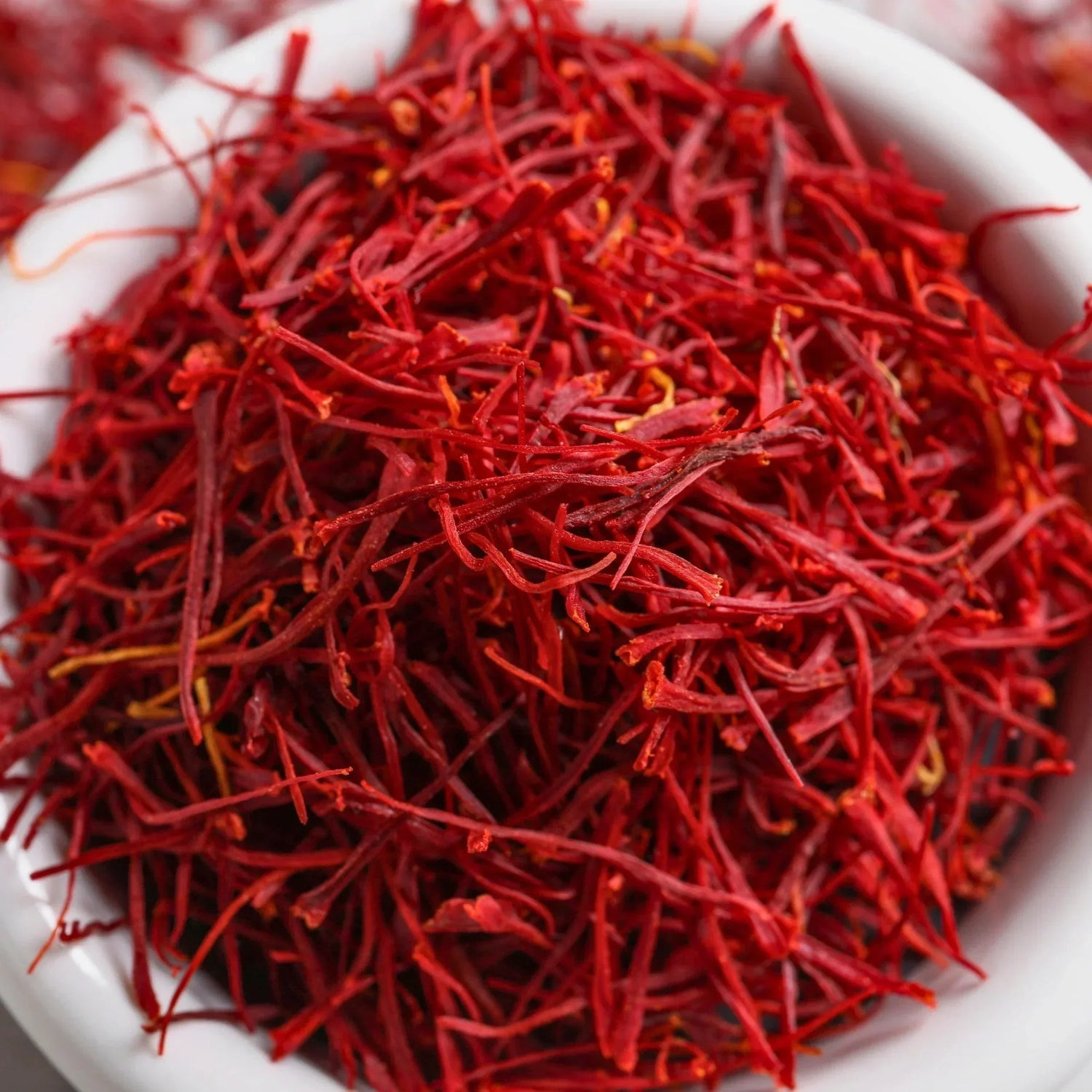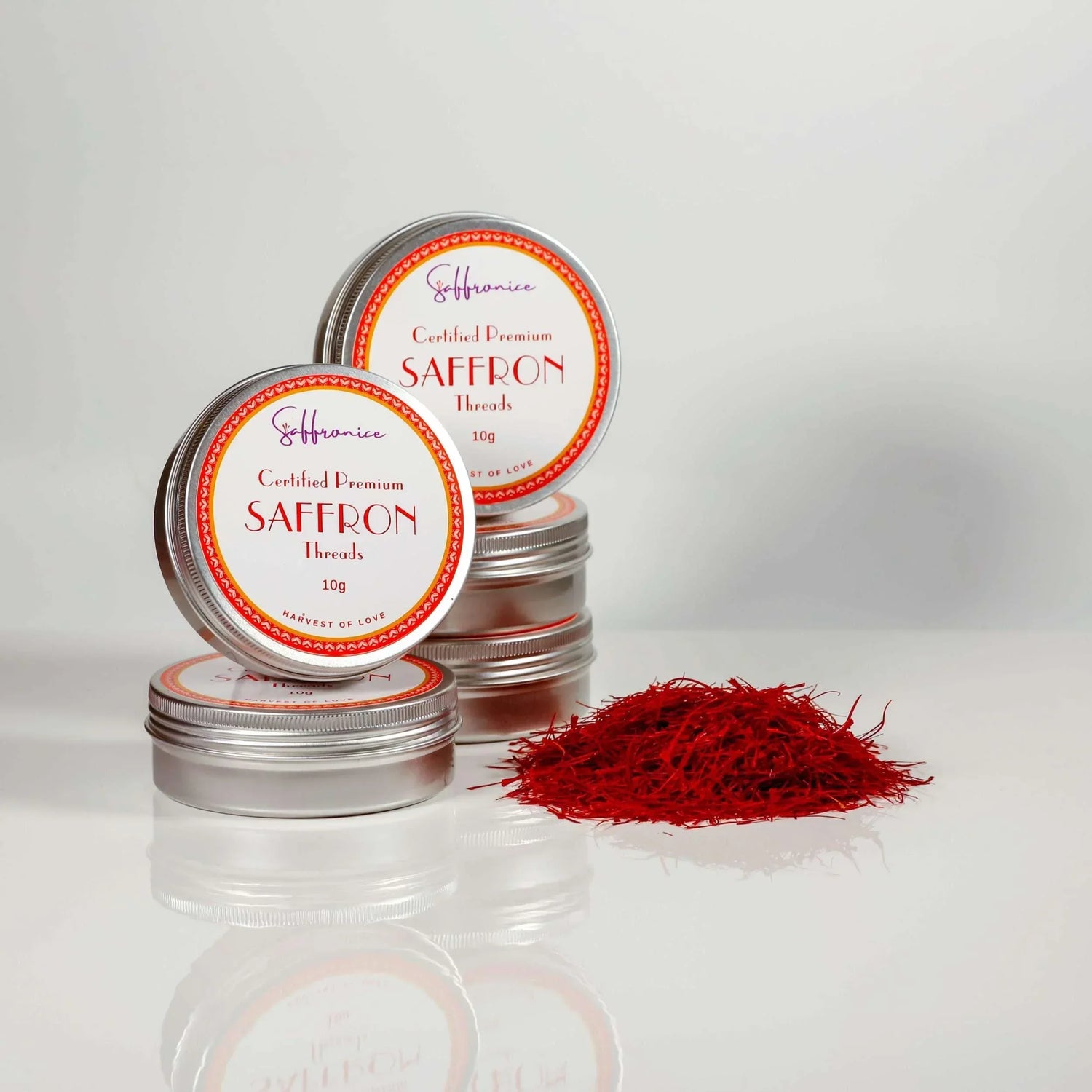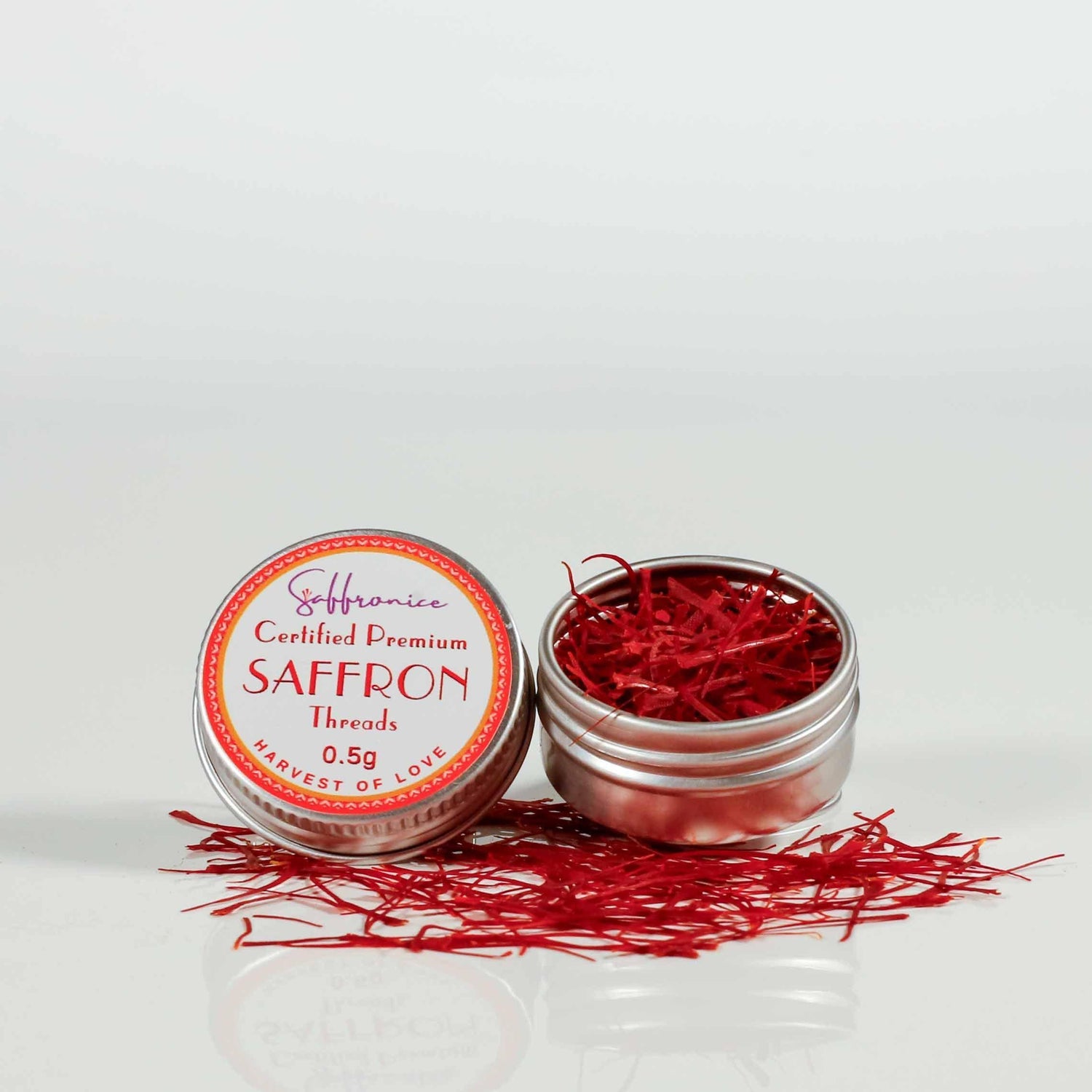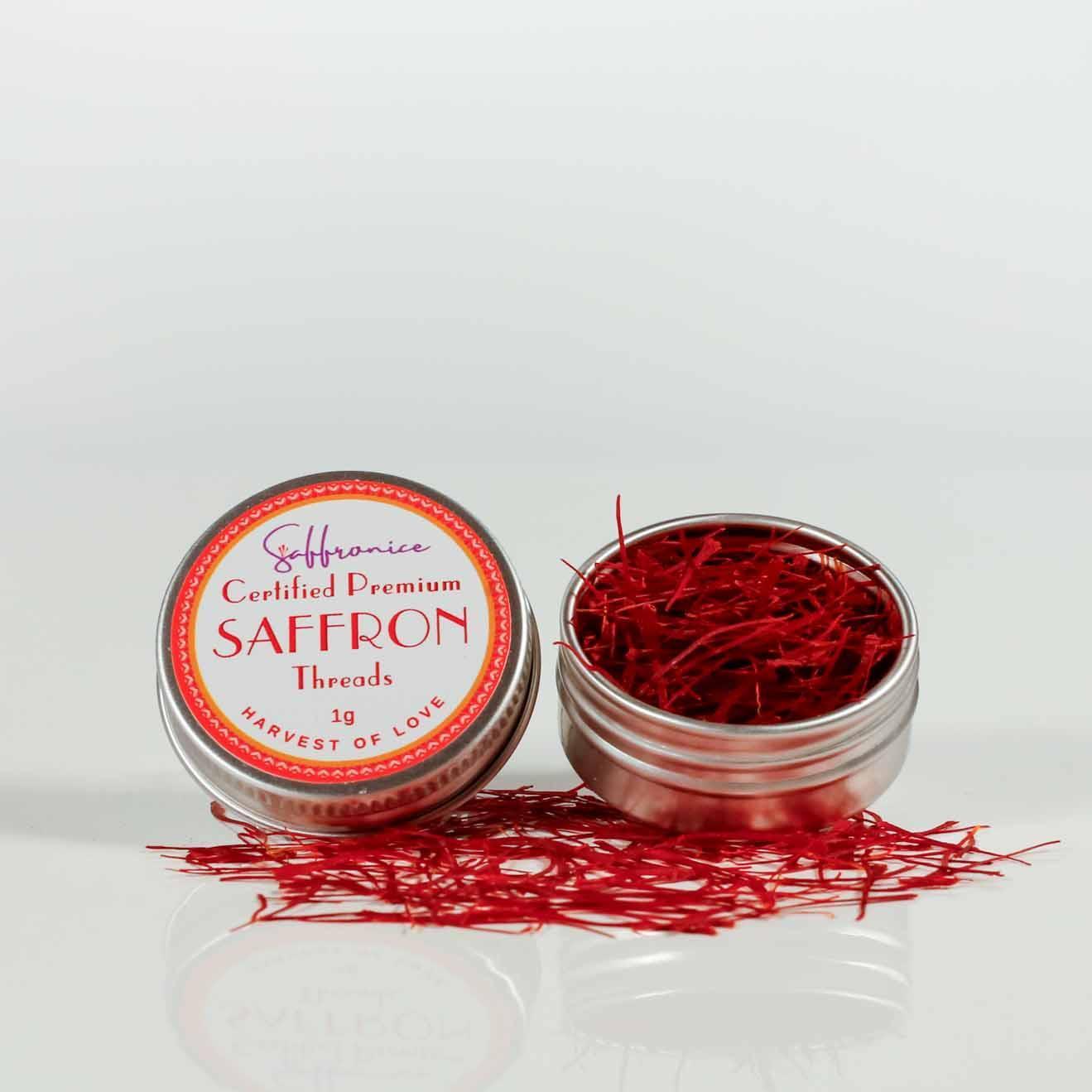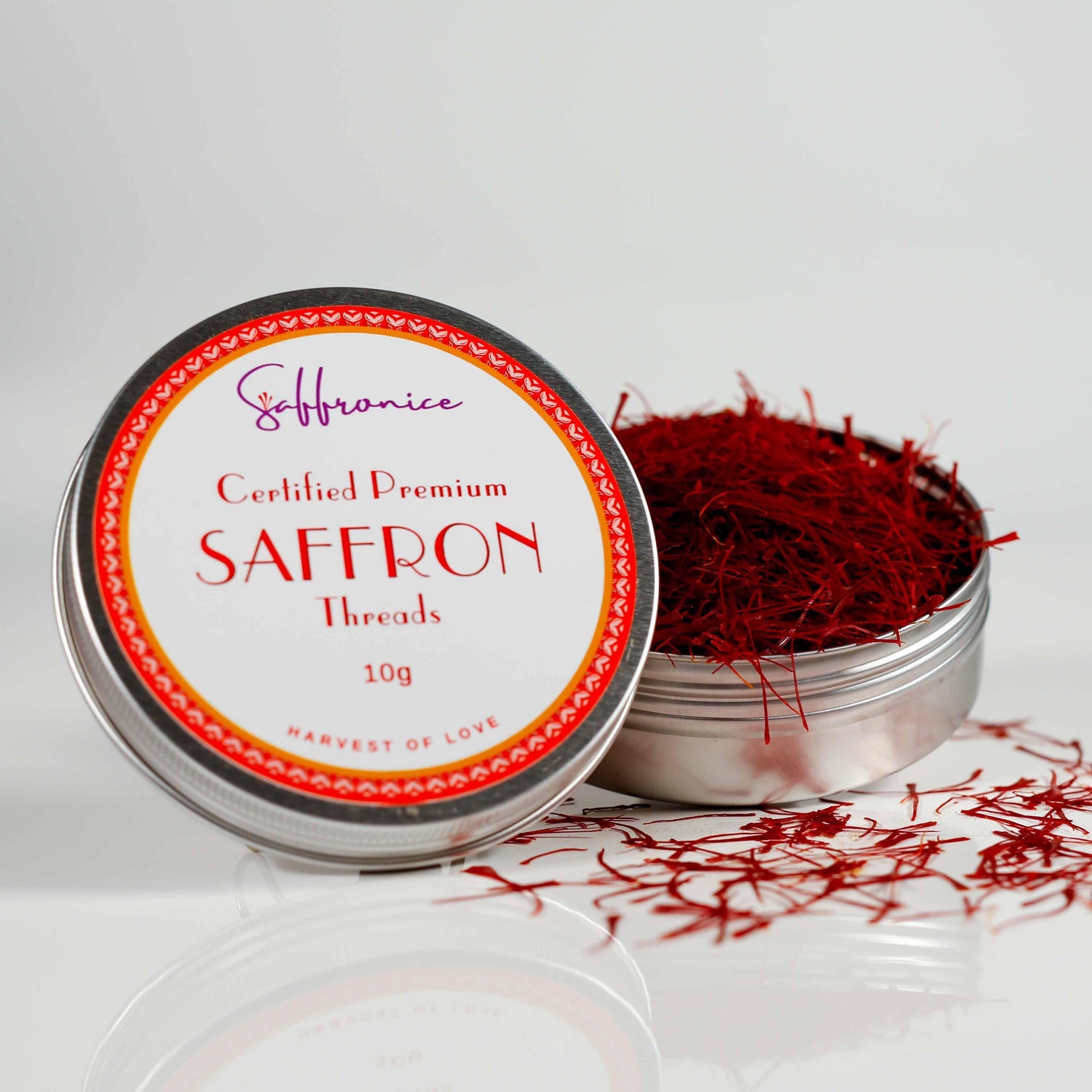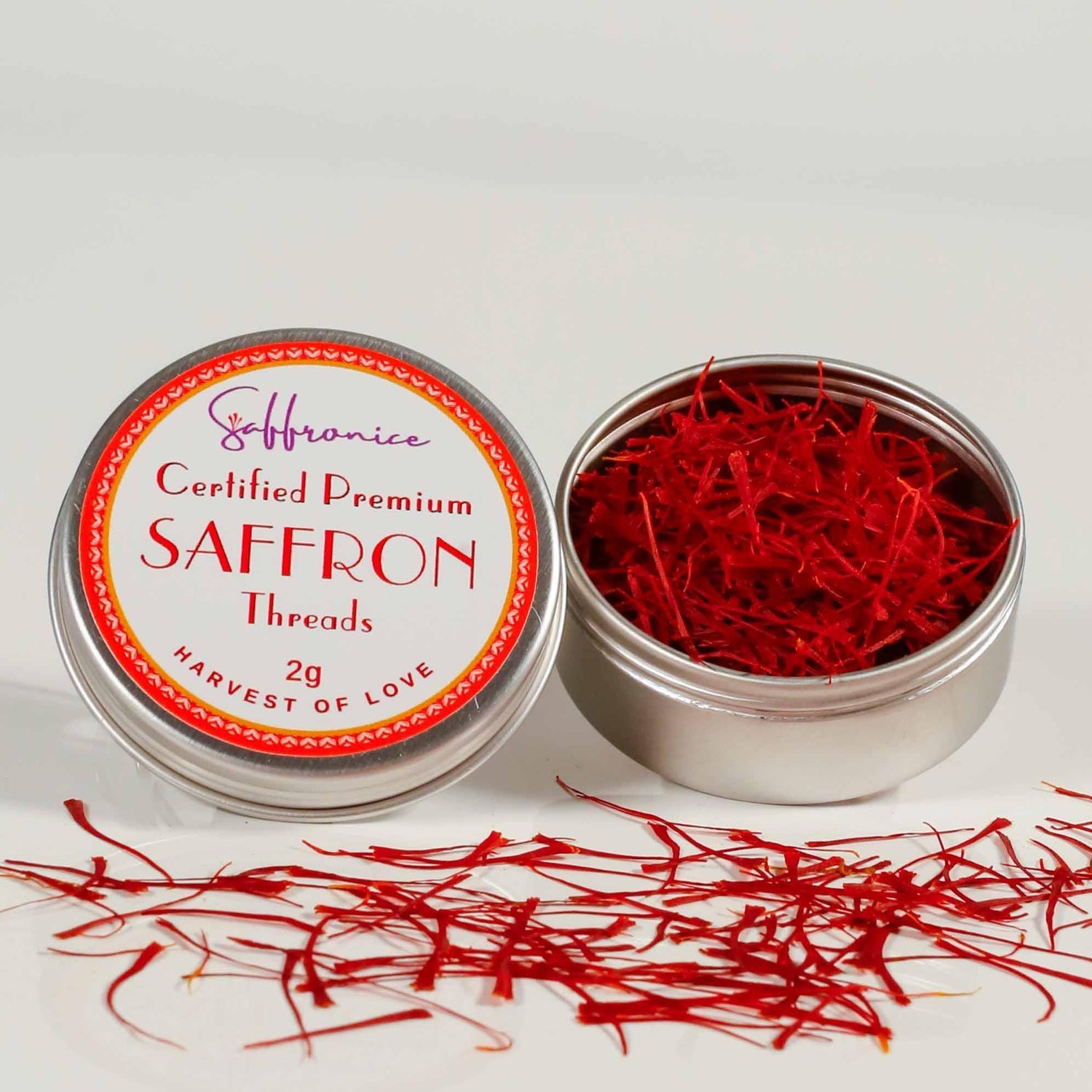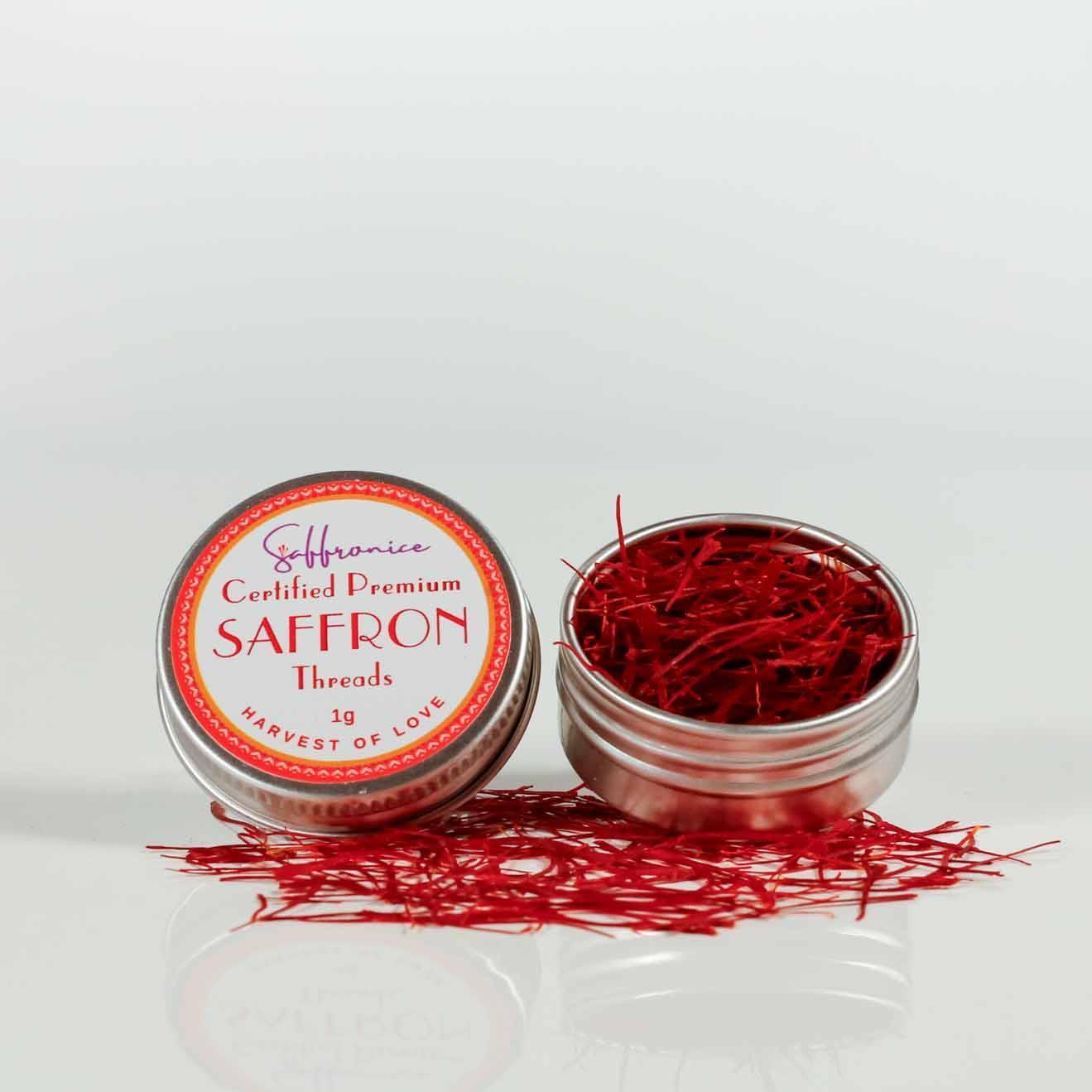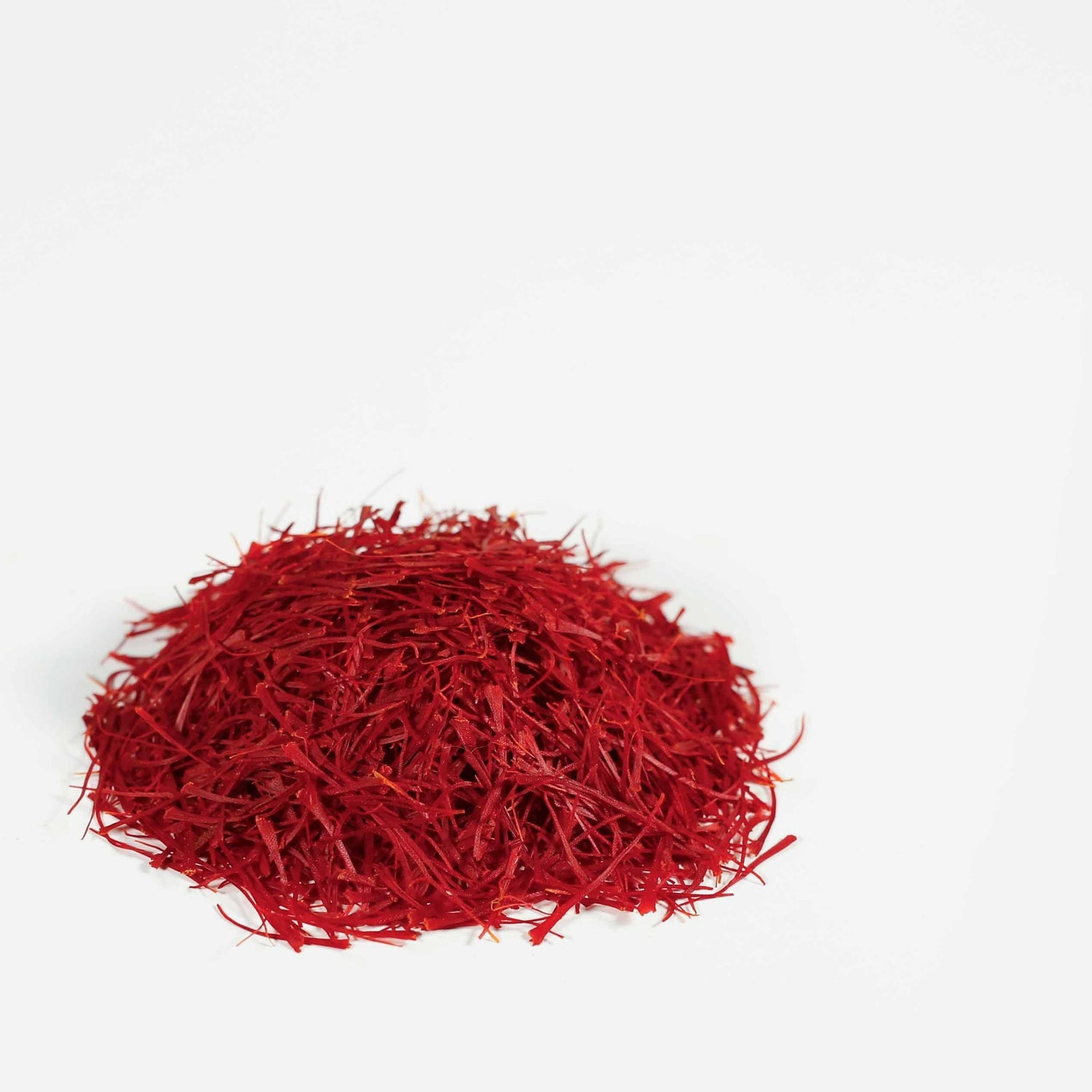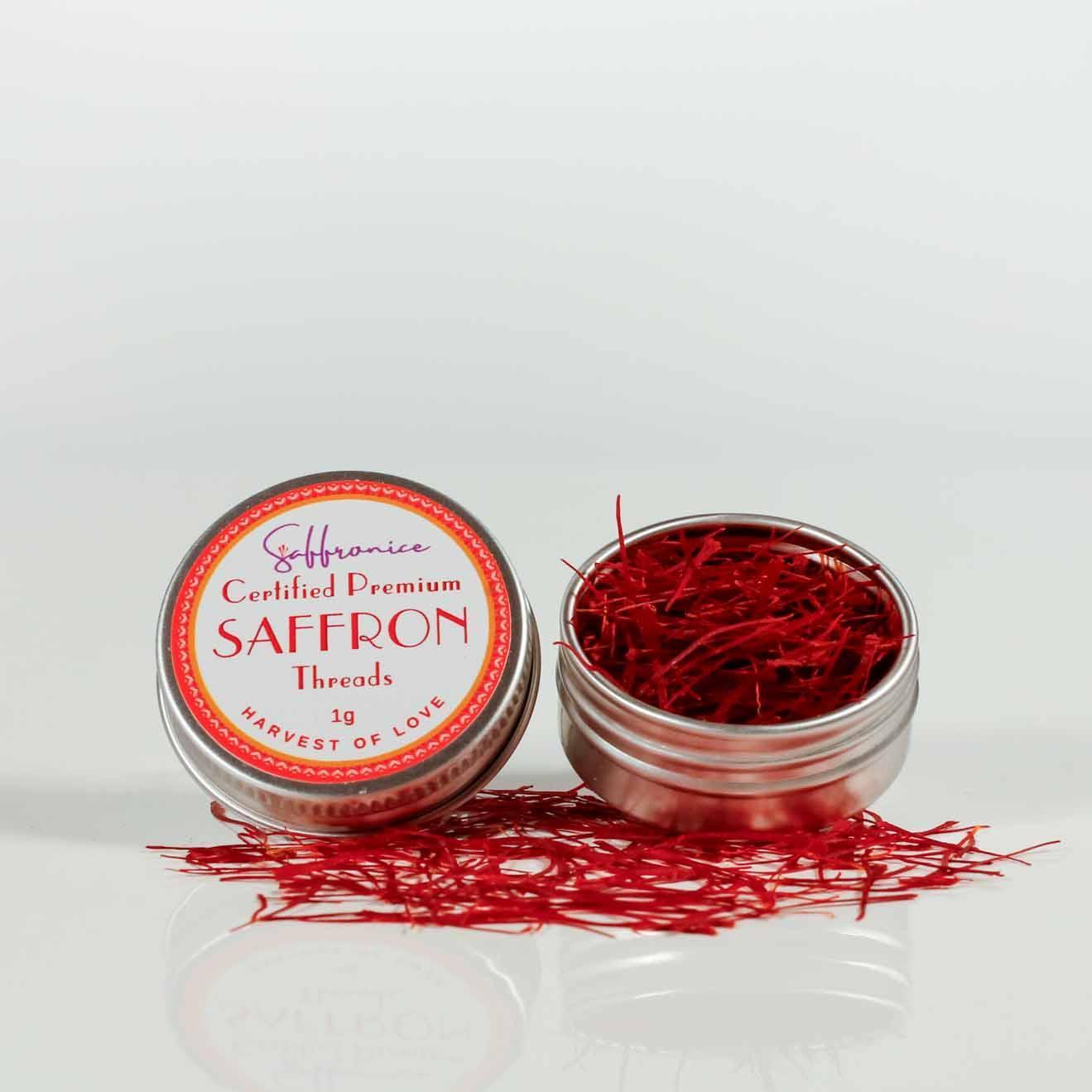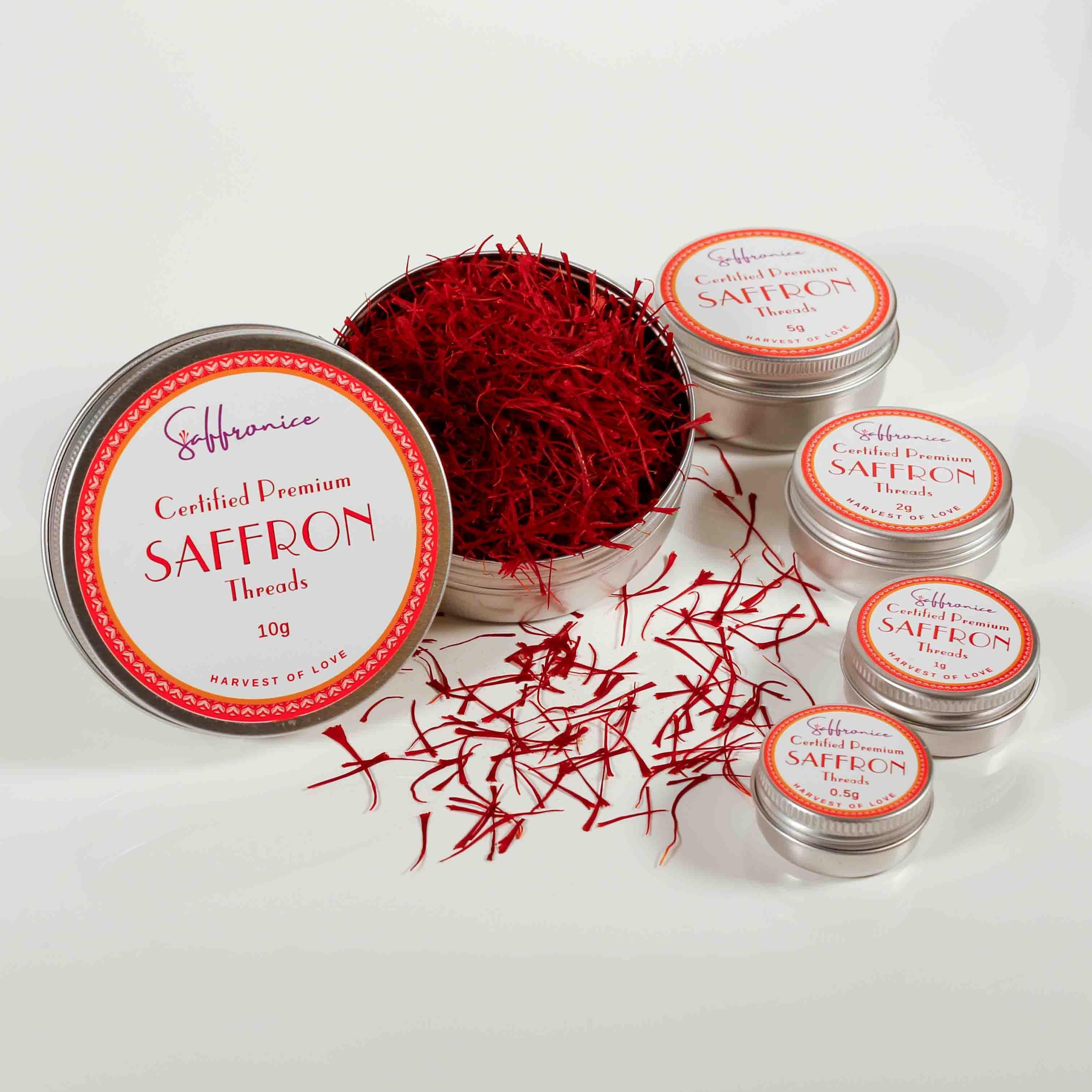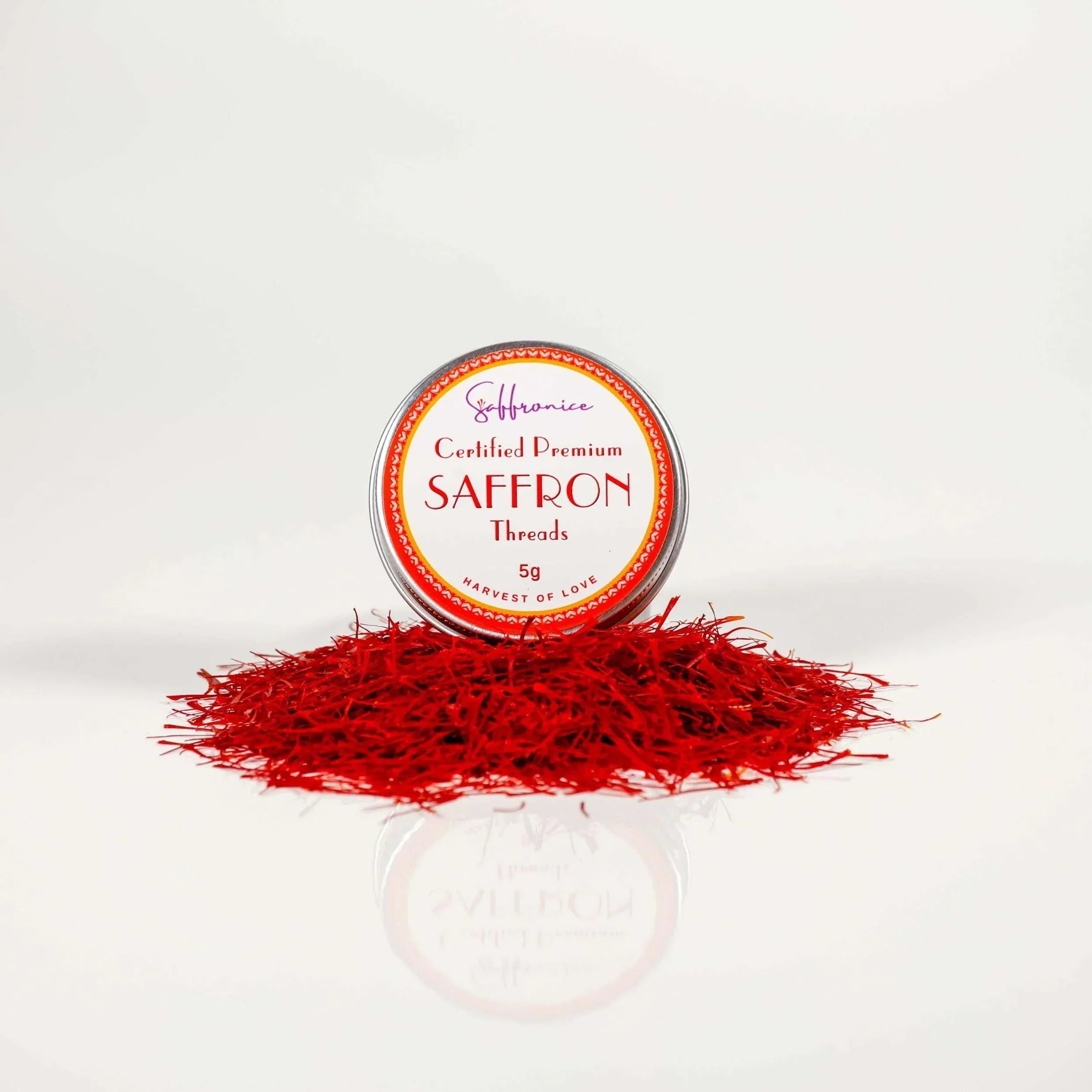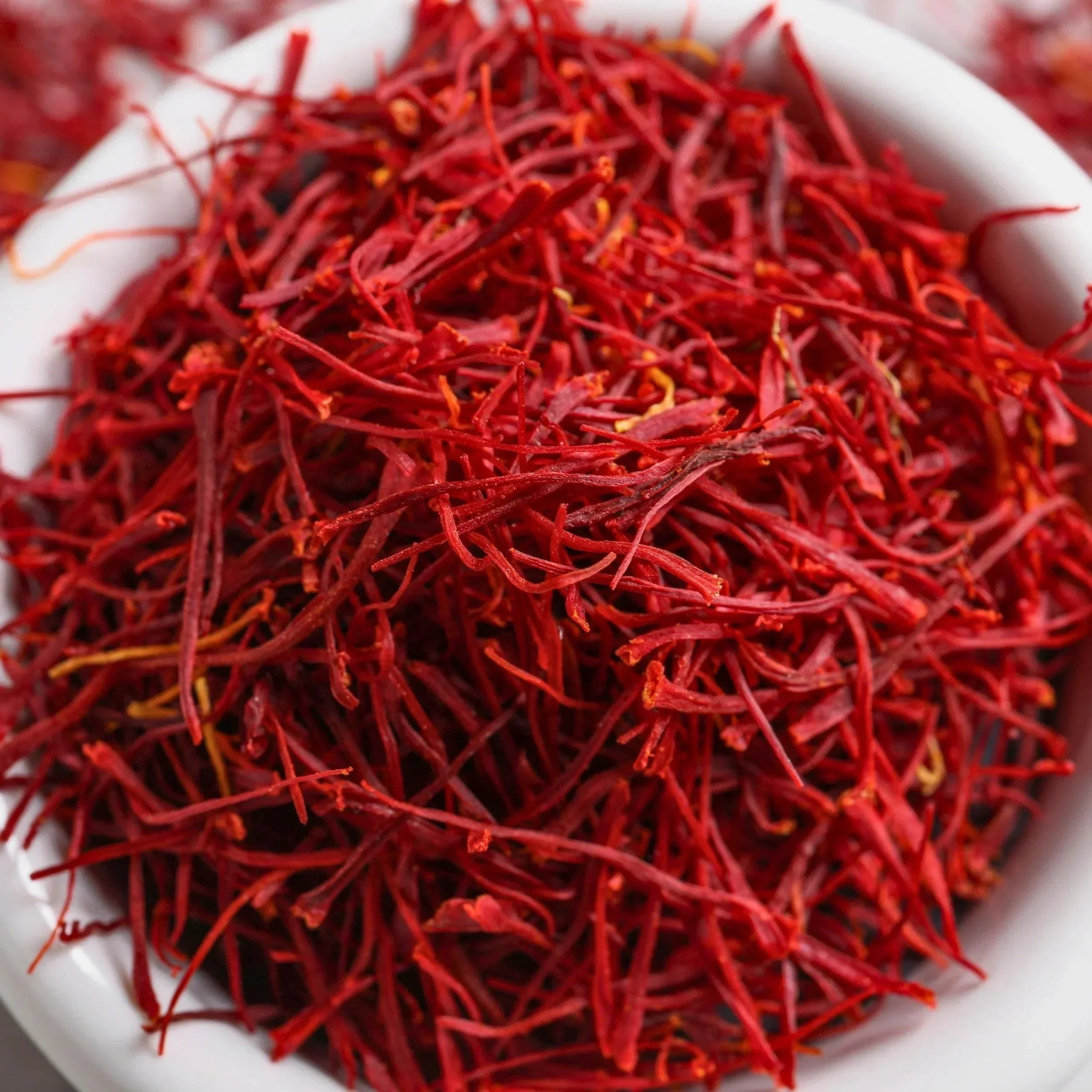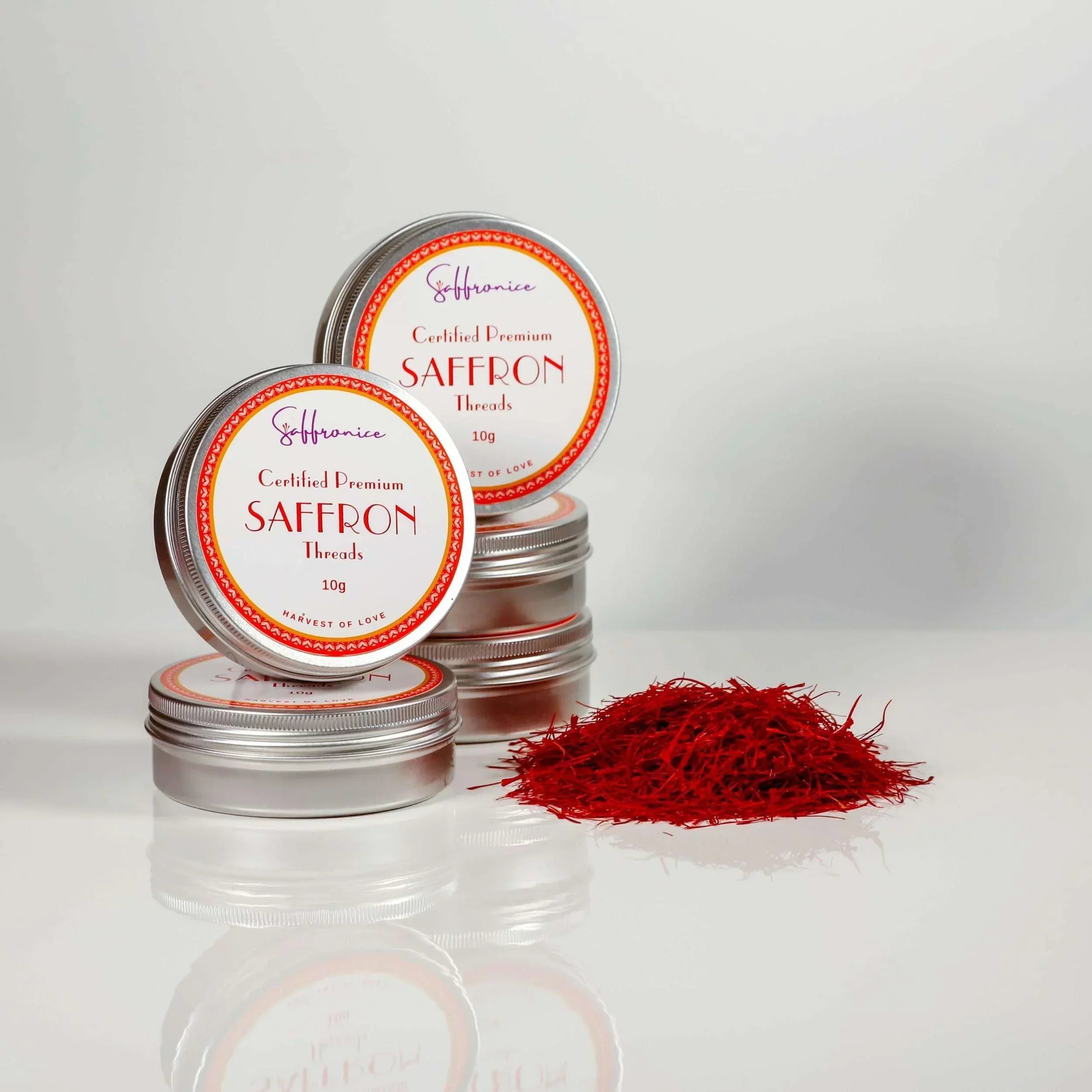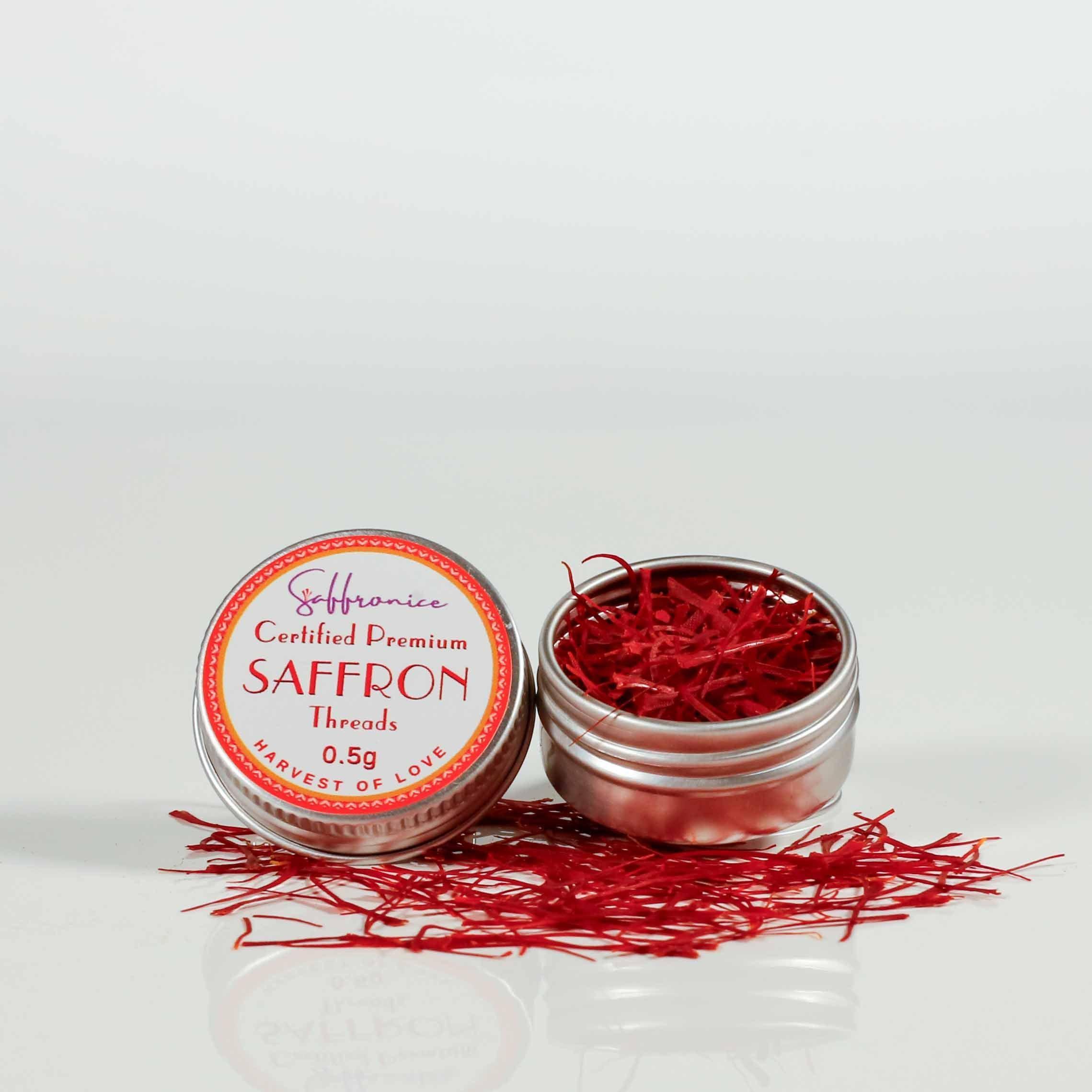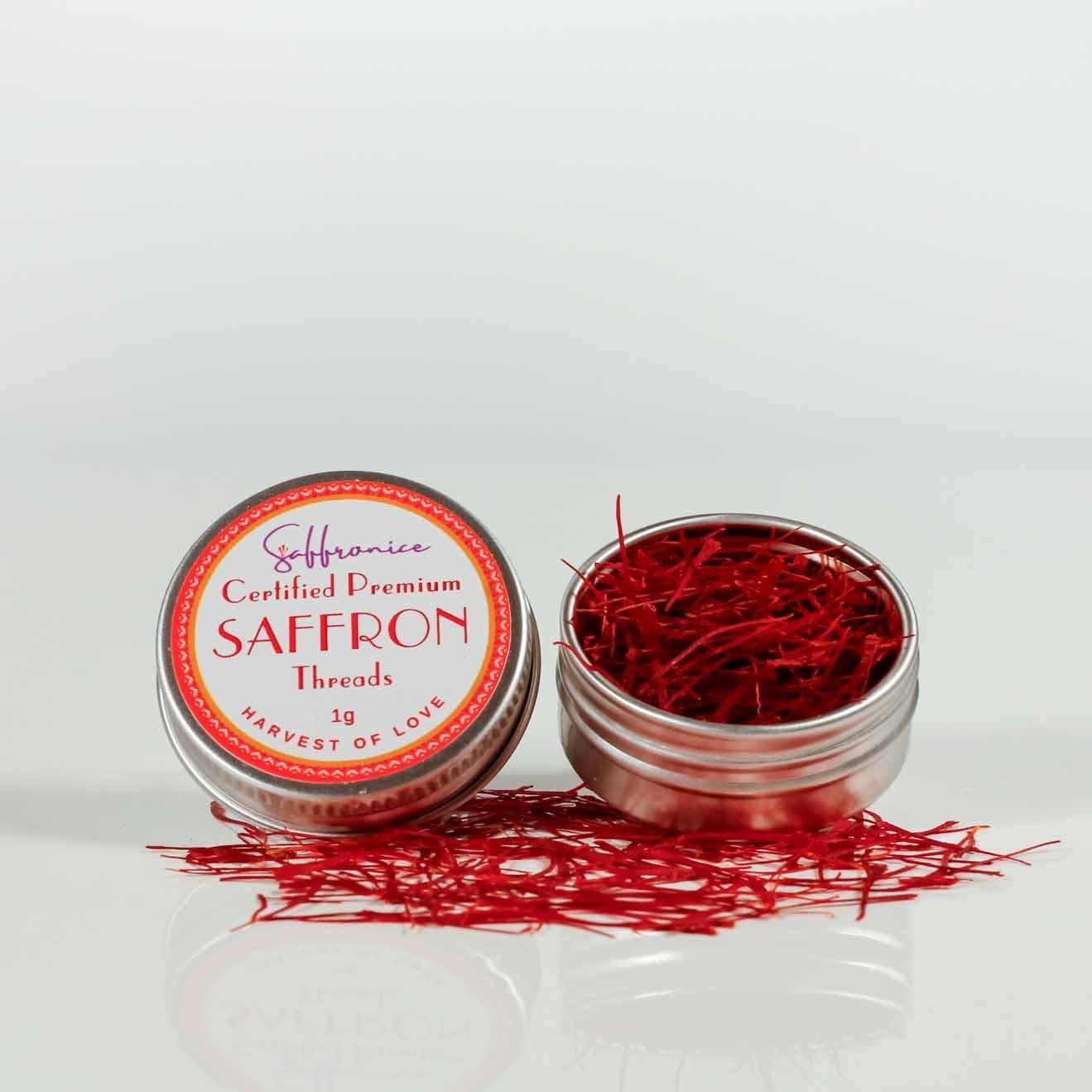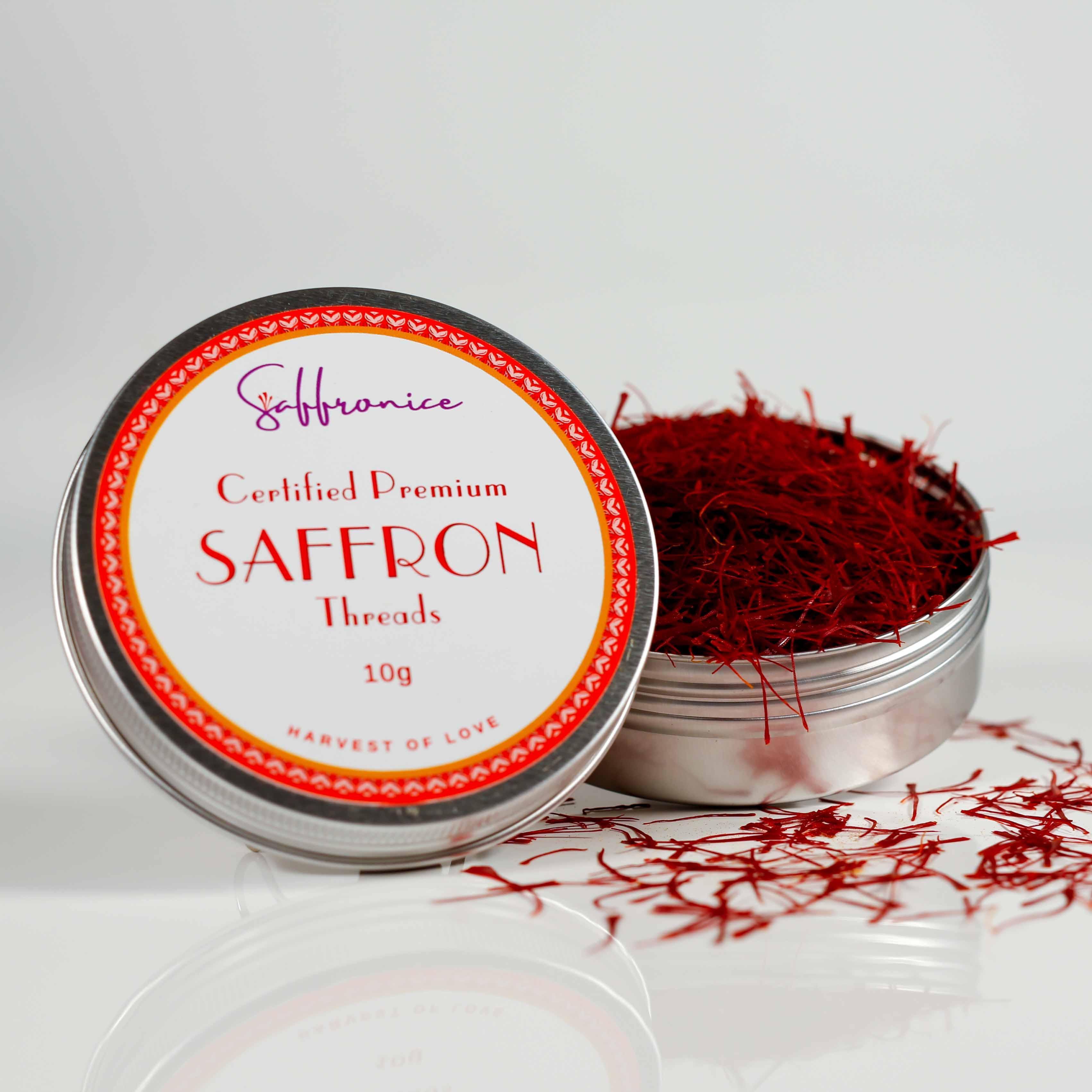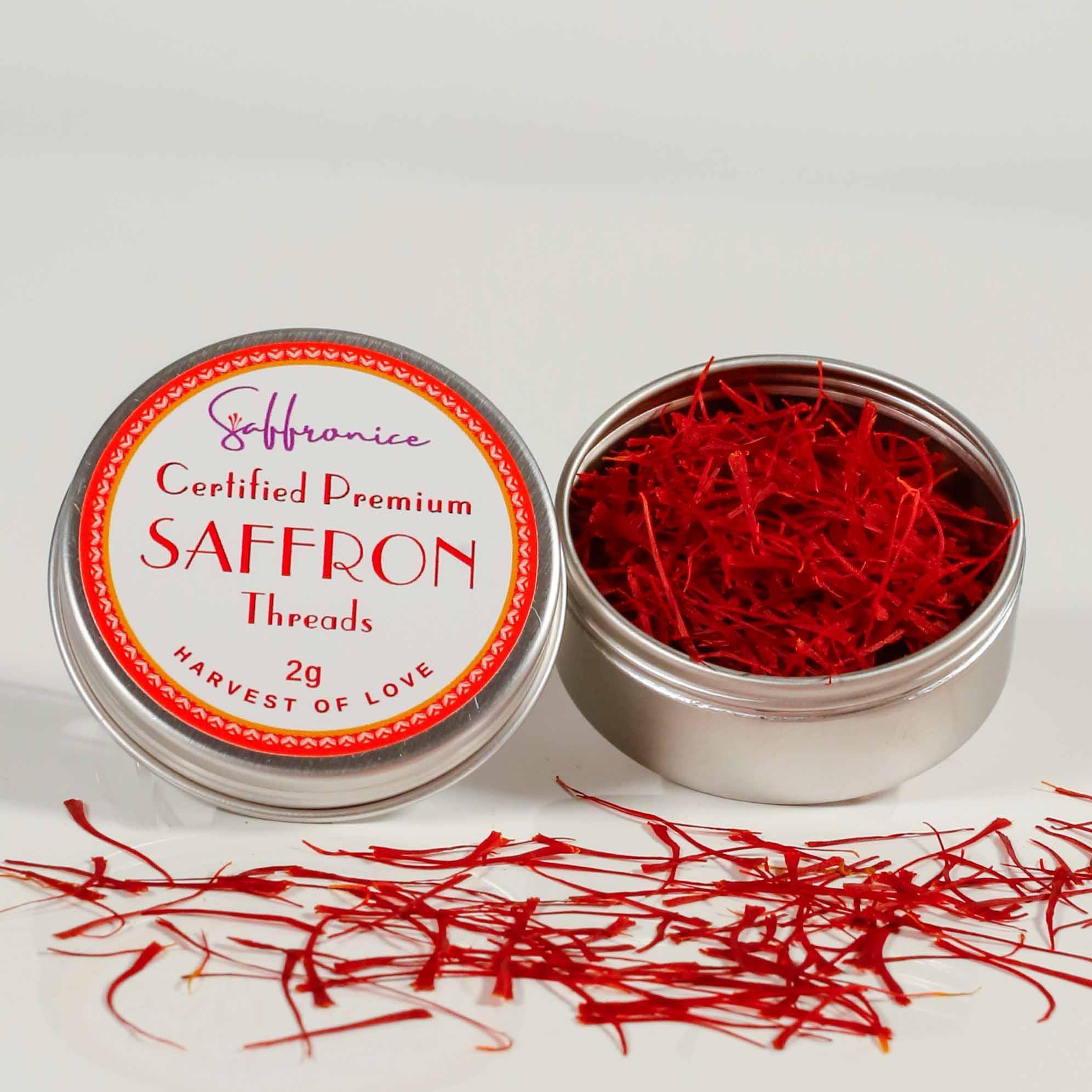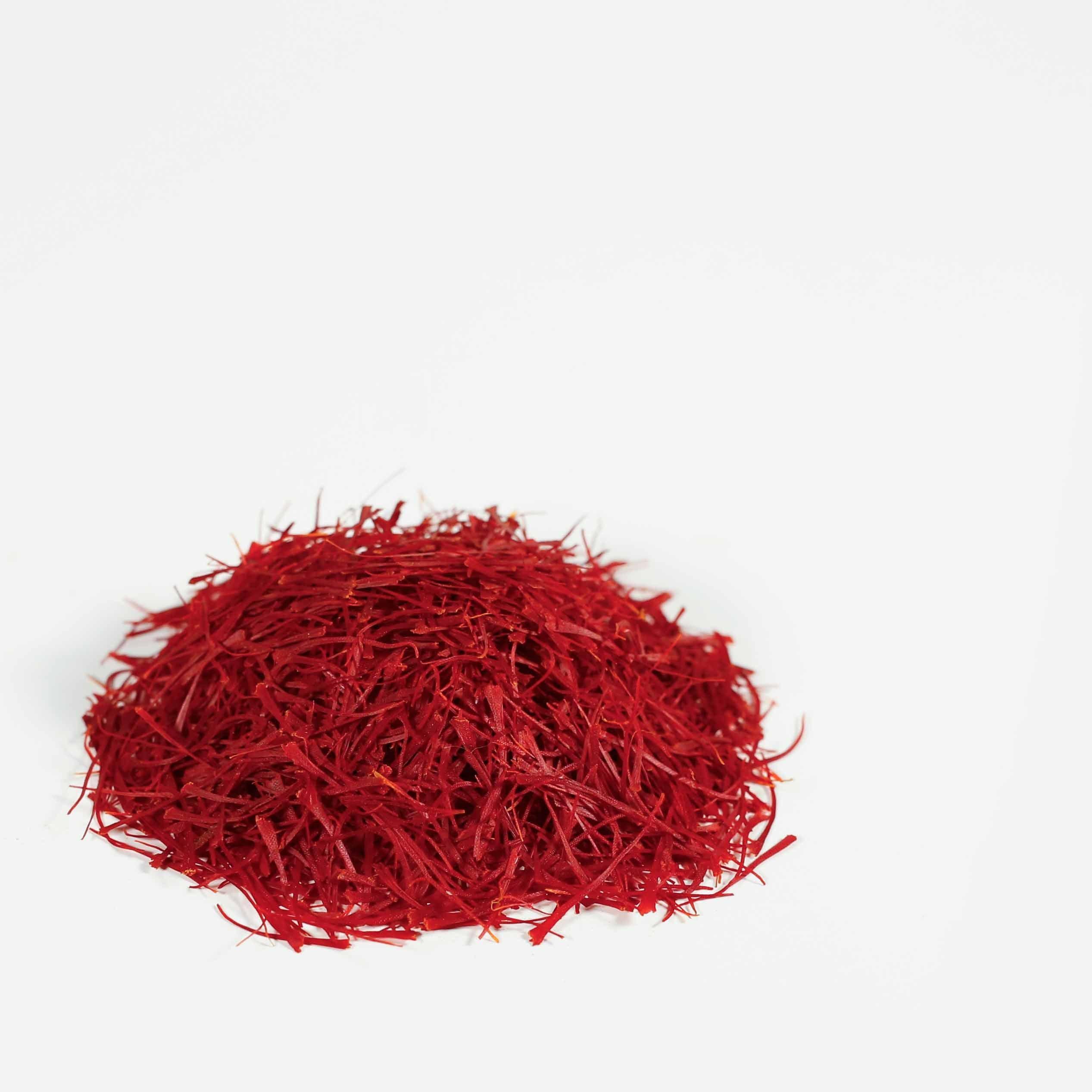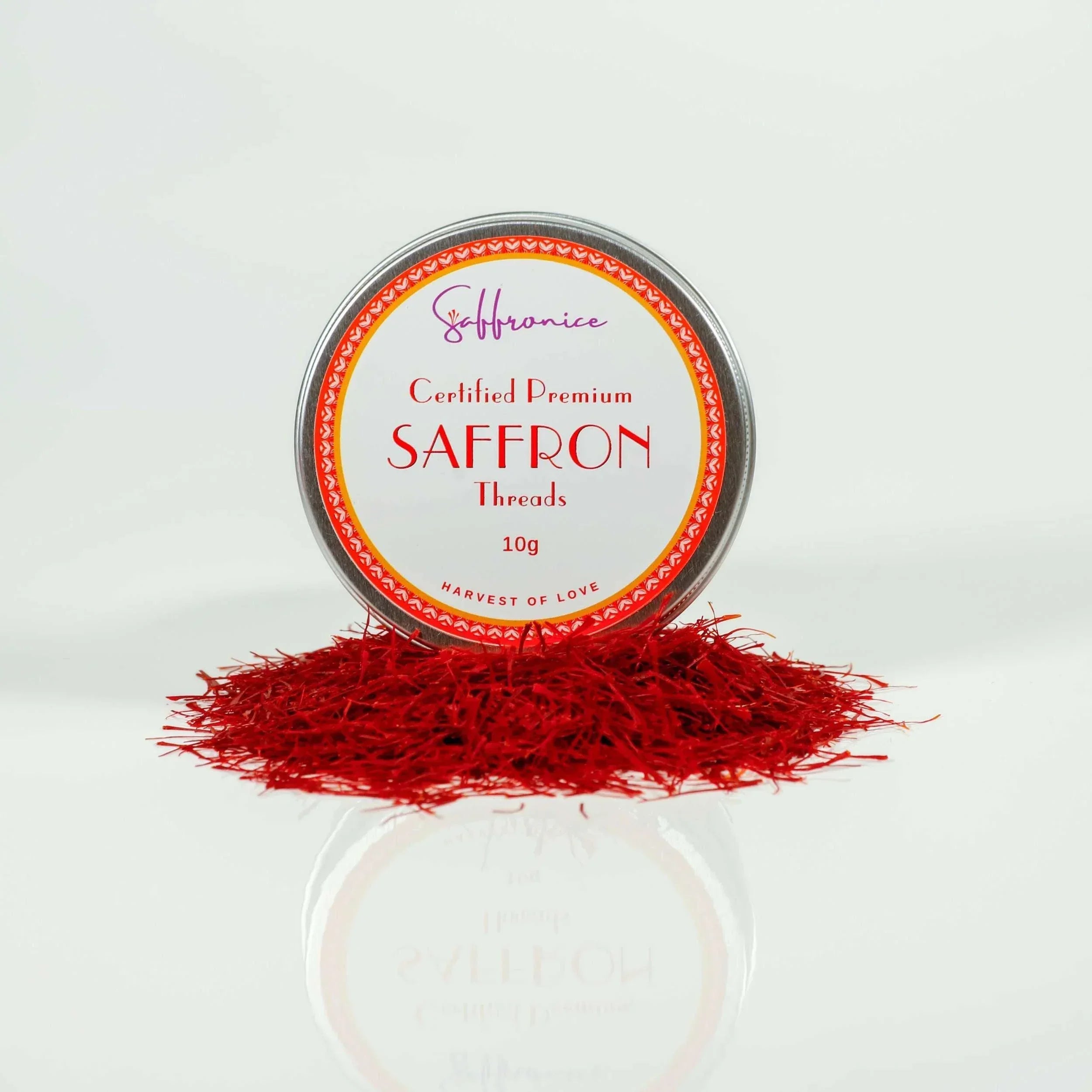Overview of Saffron and Its Uses
Saffron, a spice derived from the dried stigmas of the Crocus sativus flower, boasts a rich history and a multitude of uses, ranging from culinary delights to therapeutic remedies. Revered for its vibrant hue, distinctive flavour, and aromatic essence, saffron has carved out a unique niche in gastronomy, health, and beauty. Its applications extend to enhancing dishes' taste and visual appeal, formulating herbal medicines, and even creating skincare products.
Importance of Understanding Saffron Side Effects
However, with the widespread acclaim of saffron comes a vital responsibility: understanding its potential side effects. While saffron is generally safe for consumption and use, it is imperative to recognise that, like all herbal substances, it can interact with the body in various ways. In some instances, especially when consumed in large quantities or misused, saffron can induce adverse reactions that extent from mild irritation to severe health risks.
In this complete guide, we delve into the side effects of saffron, providing you with a comprehensive understanding of what to expect and how to navigate this esteemed spice safely. Whether you are a culinary enthusiast, a health-conscious individual, or a seeker of natural remedies, this guide intent to provide you with the knowledge to use saffron wisely, ensuring its benefits can be enjoyed without compromising your health and well-being.
Link to Saffron: Uses and Risks on WebMD
| Dosage | Potential Side Effects |
|---|---|
| Under 300 mg/day (Safe) | Minimal or no side effects. |
| 300 mg - 1.5 grams/day (Potential for Side Effects) | Potential for mild side effects such as digestive discomfort, mood changes. |
| 1.5 - 5 grams/day (Dangerous) | Increased risk of significant side effects including gastrointestinal issues, mood swings, and allergic reactions. |
| More than 5 grams/day (Extremely Risky) | Risk of severe toxicity, seizures, liver and kidney damage, and serious allergic reactions. |
Disclaimer: This article is for informational purposes only. Individuals with specific health conditions, children, pregnant women, and nursing mothers should consult a doctor for personalized saffron dosage advice.
Common Side Effects of Saffron

The common side effects of saffron primarily occur when consumed excessively, typically exceeding the daily recommended dosage of about 1.5 grams. Awareness of these effects is crucial to ensure safe and beneficial use.
Nausea and Digestive Issues: One of the most frequently reported side effects of saffron overuse is nausea. Some individuals may also experience digestive discomfort, including diarrhea and stomach cramps. These symptoms are often the body's response to an overdose of the spice.
Headaches and Dizziness: Consuming high amounts of saffron can lead to headaches or dizziness in some individuals. This is likely due to the progressive compounds of saffron that affect the central nervous system.
Irritability and Mood Changes: Saffron contains psychoactive chemicals that can influence mood. While often used to elevate mood and treat mild depression, in larger doses, it can cause irritability or anxiety.
Allergic Reactions: Although rare, some individuals might be allergic to the pollen in saffron. Allergic reactions can manifest as skin rashes, itching, or swelling, particularly in those sensitive to other plants in the Iridaceae family.
Sleep Issues: Excessive saffron consumption can interfere with sleep patterns, causing either drowsiness or insomnia. This effect is due to the modulation of neurotransmitters in the brain by the compounds present in saffron.
Dry Mouth: A less common but notable side effect is dry mouth. Saffron's components may affect saliva production, leading to a feeling of dryness in the mouth.
While saffron is a valuable and generally safe spice when used in moderation, it's essential to be aware of these common side effects. Adhering to recommended dosages and being mindful of personal sensitivities can help mitigate these risks, ensuring a positive experience with this revered spice.
An overview of saffron benefits and side effects by RxList
Saffron Side Effects on Skin and Face

Saffron is often praised for its skin-enhancing properties, including its ability to improve complexion, reduce pigmentation, and add a healthy glow. However, its application on the skin and face has potential side effects, particularly if misused or by individuals with specific sensitivities.
Allergic Reactions: The most common side effect when using saffron on the skin or face is an allergic reaction. This can manifest as redness, itching, rashes, or hives. Individuals predisposed to allergies, especially those related to plants and herbs, should conduct a patch test before applying saffron-based products to larger skin areas.
Dryness and Irritation: Some individuals may experience dryness or irritation, especially if the saffron is of lower quality or used in high concentrations. This can lead to flaking, peeling, or a feeling of tightness in the skin, which can be particularly discomforting for those with already dry or sensitive skin types.
Photo-sensitivity: Saffron can increase the skin's sensitiveness to sunlight, directing to a higher risk of sunburn. This photo-sensitivity necessitates sunscreen and protective clothing outdoors, especially after applying saffron-infused products to the face or other exposed areas.
Acne Breakouts: In some cases, especially for those with oily or acne-prone skin, saffron can exacerbate acne issues. The spice may clog pores or trigger an overproduction of oil, leading to breakouts.
Uneven Skin Tone: While saffron is known for its skin-lightening properties, improper or excessive use can result in uneven skin tone or hyperpigmentation. This is particularly likely if the saffron is not evenly applied or used with other potent skin-lightening agents.
Eye Irritation: When applying saffron close to the eyes, such as in homemade face masks or creams, there is a risk of eye irritation. Saffron particles can cause discomfort, redness, or even temporary vision disturbances if they come into contact with the eyes.
To minimise these side effects, it is recommended to use saffron-infused products formulated for facial use, follow the instructions carefully, and always perform a patch test before widespread application. Individuals with sensitive skin or known allergies should consult a dermatologist before incorporating saffron into their skincare routine.
Saffron Side Effects Headache and Blood Pressure
Saffron, while beneficial for various health and culinary purposes, can have specific side effects related to headaches and blood pressure when consumed inappropriately.
Headache: Some individuals may experience headaches as a side effect of saffron consumption. This can occur because Saffron's active compounds affect the central nervous system. Headaches might be more pronounced in those sensitive to the spice or when consumed in large quantities.
Blood Pressure Fluctuations: Saffron has been noted to influence blood pressure levels. It can help reduce high blood pressure in moderate amounts due to its vasodilative properties. However, excessive intake of saffron can lead to significant fluctuations in blood pressure. For individuals with hypotension (low blood pressure), excessive saffron consumption can further lower blood pressure, potentially leading to symptoms like dizziness and fainting. Conversely, for some, it might cause a spike in blood pressure, especially if combined with other blood pressure-altering medications or substances.
Consuming saffron in moderation and being aware of individual sensitivities is essential to minimise these side effects. Additionally, individuals with pre-existing blood pressure issues or those on related medication should consult a healthcare professional before incorporating saffron into their diet or wellness routine.
Impact on Mental Health: Saffron Side Effects Mental Health

The impact of saffron on mental health is a complex area, as it exhibits both therapeutic benefits and potential side effects. While saffron is often used for its mood-enhancing properties and has shown promise in treating mild to moderate depression, its impact on mental health can vary based on dosage and individual sensitivity.
Positive Effects on Mood and Depression: Saffron contains bioactive compounds like crocin and safranal, which have been studied for their antidepressant properties. These compounds can influence neurotransmitters, such as serotonin and dopamine, crucial in mood regulation.
Anxiety and Agitation: In some cases, mainly when consumed in higher than recommended doses, saffron can cause increased anxiety and agitation. This might be due to its stimulating effect on the central nervous system.
Mood Swings: High doses of saffron can lead to mood swings. The same properties that help in alleviating depression can, when overused, cause significant shifts in mood, leading to instability and irritability.
Dependence and Withdrawal: While not typical, there is a possibility of developing a dependence on saffron, mainly when used regularly for its mood-lifting effects. Abrupt discontinuation after prolonged use might result in withdrawal symptoms, although such cases are rare.
Interaction with Psychiatric Medications: Saffron can interact with certain psychiatric medications, including antidepressants. This interaction can alter these medications' effectiveness or lead to adverse effects.
Considering these diverse effects, individuals with existing mental health conditions or those on psychiatric medications need to consult with a healthcare professional before using saffron as a complementary treatment. While saffron can be a beneficial adjunct in managing specific mental health issues, it should be used with caution and under professional guidance to ensure safety and efficacy.
Link to an study on PubMed: Saffron as an Antidepressant
Side Effects of Saffron Extract and Supplements

Using saffron extract and supplements has become increasingly popular for their potential health benefits. However, supplements can have side effects, mainly when consumed excessively or without proper guidance.
Gastrointestinal Discomfort: One of the most common side effects of saffron supplements is gastrointestinal upset. This includes symptoms like nausea, vomiting, diarrhea, and abdominal pain. These issues often arise from taking too high a dose of the supplement.
Allergic Reactions: Some people may experience hypersensitivity to saffron extract, manifesting as skin rashes, itching, or respiratory problems. People with allergies to other plants in the Iridaceae family should be particularly cautious.
Mood and Neurological Effects: High doses of saffron supplements can affect the central nervous system, leading to side effects like headaches, dizziness, and even anxiety or mood swings. This is due to the influence of active compounds in saffron on brain chemistry.
Interactions with Medications: Saffron supplements can interact with certain medications, such as blood thinners, blood pressure medications, and antidepressants. This interaction can either potentiate or diminish the effects of these medications, leading to health risks.
Impact on Blood Pressure and Heart Rate: Saffron extracts can lower blood pressure and modify heart rate. While this can be beneficial in some cases, it might pose risks for individuals with pre-existing cardiovascular conditions or those on related medications.
Risks During Pregnancy and Breastfeeding: The use of saffron supplements is generally discouraged during pregnancy due to the risk of miscarriage and uterine stimulation. The safety of saffron supplementation during breastfeeding is also not well established.
Potential Toxicity: Although rare, consuming highly high doses of saffron extract can lead to toxicity, with symptoms like yellowing of the skin and eyes, dizziness, bleeding, and, in severe cases, organ failure.
To minimise these side effects, it's crucial to adhere to the recommended dosages of saffron supplements and consult with a healthcare provider, especially if you have underlying health conditions or are taking other medications. The key is to approach the use of saffron extracts and supplements with the same caution as any other potent herbal remedy.
Saffron Side Effects in ADHD

The use of saffron for Attention Deficit Hyperactivity Disorder (ADHD) has been explored in various studies, with some indicating its potential as a natural treatment option. However, like any therapeutic substance, saffron can have side effects, especially when considering its use for ADHD.
Stimulation of the Central Nervous System: Saffron contains active compounds that can stimulate the central nervous system. While this can potentially benefit individuals with ADHD by improving focus and cognitive function, it may also lead to overstimulation, resulting in restlessness or insomnia, particularly in sensitive individuals or when used in high doses.
Interaction with ADHD Medications: If an individual with ADHD is already on medication such as stimulants (e.g., methylphenidate) or non-stimulants, adding saffron might interact with these medications. This interaction can either enhance or diminish the effectiveness of the ADHD medication or increase the risk of side effects.
Mood Fluctuations: Saffron can impact mood due to its effect on neurotransmitters like serotonin and dopamine. While this can be beneficial in managing some symptoms of ADHD, it can also lead to mood swings or emotional instability in some individuals, particularly when not used in appropriate dosages.
Gastrointestinal Issues: Saffron, especially in higher doses, can cause gastrointestinal disturbances such as nausea, vomiting, or diarrhea. These side effects can be particularly challenging for children and adolescents with ADHD.
Allergic Reactions: Although rare, there is a possibility of allergic reactions to saffron, which can manifest as skin rashes, itching, or respiratory issues. This is essential for anyone, particularly children, who may be more sensitive.
Appetite Changes: Saffron might influence appetite, which can be a concern in ADHD, especially in children who might already have appetite issues due to ADHD medications.
Given these potential side effects, it is crucial to approach the use of saffron for ADHD with caution. It is highly recommended to consult with a healthcare professional, preferably one who has experience in both ADHD and herbal treatments, before starting saffron as a supplement. This ensures a tailored approach considering the individual's needs, current medications, and overall health profile.
Severe Side Effects of Saffron: Addressing Rare and Severe Side Effects

While saffron is renowned for its various health benefits, knowing its potential for rare and severe side effects is crucial, especially when consumed in large amounts. These severe reactions are infrequent but can be significant.
-
Seizures: One of the more severe side effects associated with extremely high doses of saffron is the occurrence of seizures. This is due to Saffron's active compounds influencing the central nervous system. Such an effect is relatively rare but poses a serious risk, particularly in individuals with a predisposition to seizures or epilepsy.
-
Liver Damage: Excessive intake of saffron can lead to liver toxicity. The liver is responsible for processing and detoxifying substances, and overwhelming it with high levels of saffron can result in liver damage. Symptoms of liver toxicity include jaundice (yellowing of the skin and eyes), abdominal pain, and elevated liver enzymes.
-
Kidney Damage: Similarly, an overdose of saffron can also affect kidney function. The kidneys are vital for filtering and eliminating waste products from the body. Consuming saffron in extremely high doses can lead to kidney damage, manifested by changes in urine output, swelling in the legs and ankles due to fluid retention, and pain in the kidney area.
These severe side effects underscore the importance of adhering to recommended dosages when using saffron as a spice, supplement, or herbal remedy. Individuals considering using saffron in any form should consult with a healthcare professional, especially if they have pre-existing health conditions or are taking medications that can interact with saffron. It is always better to err on the side of caution to prevent these rare but severe reactions.
Saffron Side Effects in Pregnancy and Breastfeeding

The use of saffron during pregnancy requires careful consideration due to potential risks. While saffron is often consumed for its flavour and purported health benefits, pregnant individuals should be aware of the following side effects:
Risk of Miscarriage: One of the most significant concerns with a high dosage of saffron consumption during pregnancy is the increased risk of miscarriage. Saffron possesses stimulant properties that can stimulate the muscles of the uterus. In high doses, this stimulation can lead to contractions, which may elevate the risk of miscarriage, especially in the early stages of pregnancy.
Potential Birth Defects: Although research is limited in this area, high doses of saffron could potentially lead to congenital disabilities. Saffron contains certain compounds that, when taken in large amounts, might cross the placental barrier and affect fetal development. This could result in congenital abnormalities, including heart or neural development issues.
Given these potential risks, pregnant individuals should exercise extreme caution with saffron consumption. It is advisable to avoid high doses of saffron and to consult with a healthcare provider before including saffron in the diet or as a supplement. Healthcare professionals can offer guidance on safe consumption levels, if any, and provide alternatives for managing health and wellness during pregnancy. The key is prioritising the safety and well-being of the mother and the developing fetus.
How to Minimise Side Effects of Saffron

To safely enjoy the benefits of saffron while minimising potential side effects, it's essential to follow specific guidelines and take appropriate precautions:
Guidelines to Reduce Saffron Side Effects
-
Moderate Consumption: Consuming saffron in moderation is the key to avoiding adverse effects. A general recommendation is limiting intake to approximately 300mg daily or less.
-
Gradual Introduction: If you're new to saffron, start with small amounts to see how your body reacts, gradually increasing to the recommended dose if no adverse effects are observed.
-
Quality Matters: Ensure you're using high-quality saffron. Adulterated or low-grade saffron may have impurities that can cause adverse reactions.
-
Storage and Freshness: Store saffron properly in the refrigerator or a cool, dark, and dry place to maintain quality and prevent spoilage.
Recommended Dosage and Precautions
-
Adhere to Dosage Recommendations: For culinary uses, a pinch of saffron threads (100-200mg) is typically sufficient for most recipes. When using saffron supplements, follow the dosage instructions provided on the package or as a healthcare professional recommends.
-
Be Aware of Interactions: Saffron can interact with certain medications, including blood thinners and antidepressants. If you are on any medication, consult with a healthcare provider before adding saffron to your regimen.
-
Avoid if Allergic: If you have a known allergy to saffron or other plants in the Iridaceae family, it's best to avoid saffron altogether.
Advice for Pregnant Individuals and Those with Health Conditions
-
Consultation is Key: Pregnant individuals should consult their healthcare provider before using saffron, as it can stimulate uterine contractions and may pose risks to the pregnancy.
-
Special Considerations for Health Conditions: Individuals with pre-existing health conditions, particularly those affecting the liver, kidneys, or central nervous system, should seek medical advice before consuming saffron.
-
Monitor Blood Pressure and Mood: If you have blood pressure issues or mood disorders, monitor your condition closely when consuming saffron and report any significant changes to your healthcare provider.
By following these guidelines and taking appropriate precautions, you can reduce the risk of side effects associated with saffron and maximise its potential benefits. When in doubt, seeking professional advice is always the best course of action.
Conclusion
In summary, while saffron offers many benefits, it is essential to balance these with an awareness of its potential side effects. By respecting recommended dosages, being mindful of individual health conditions, and opting for quality products, one can safely enjoy the diverse advantages of saffron.



